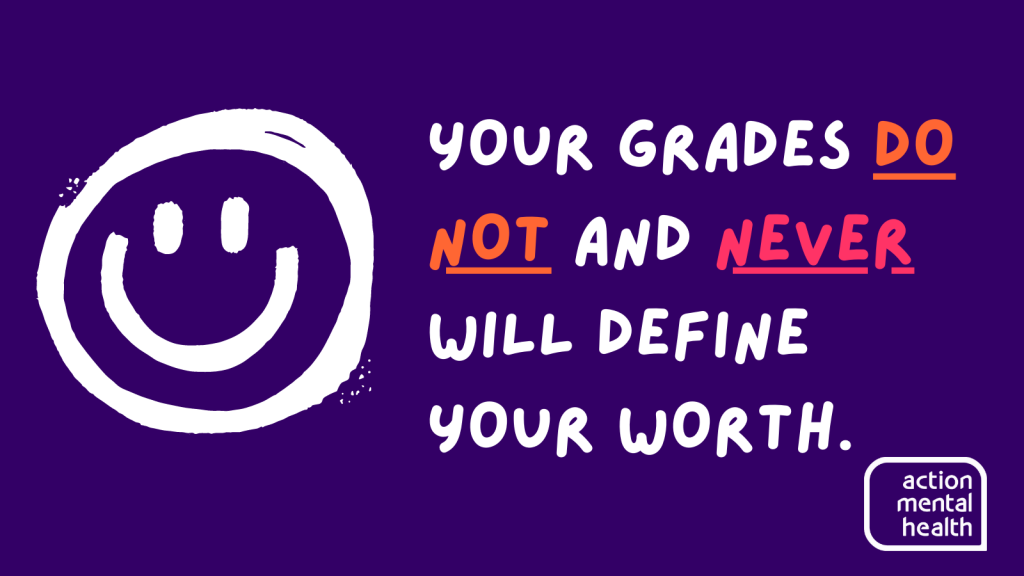The stress levels of school children and students start to rise as they approach exam results days, often with fear and trepidation. Action Mental Health is offering young people and families support and tips on getting prepared and learning to recognise and deal with exam results stress.
It is normal to feel a bit worried about exam results, especially if you’re under pressure from school or family. It can cause you to feel anxious or depressed, and this might affect your sleeping or eating habits.
If you recognise any of these feelings or are worried that exam results pressure is taking over your life, you are not alone, and there are things you and those around you can do to help.
In this article, we highlight some useful tips to help you overcome the feelings you may have about your exam results.
Symptoms of excessive stress include:
- Physical effects such as headaches, dizziness and stomach upset.
- Being preoccupied with thoughts of exams and feeling unable to relax.
- Becoming withdrawn from friends, family and hobbies.
- Constant tiredness due to problems sleeping.
- Loss of appetite or over-eating.
- Seeing only the negative side of things.
- Becoming more aggressive and short-tempered with those around you.
- Feeling so low and desperate that you are considering stopping school, running away or harming yourself.
If you can relate to any of these feelings, it is important to seek support. There are a number of services which AMH MensSana can sign-post you to that offer help and advice or you may find support from friends, family or someone at school – it doesn’t matter who, but it is important to speak to someone.
For young people
Check out our list of tips and techniques to help you deal with results day stress. Different things work for everyone so try some out and choose the ones that work best for you.
1. Talk to people around you
Try not to bottle up your feelings. Mental health issues aren’t uncommon among students, so you’ll likely know others who are struggling. Your parents or older relatives may have also felt the same sort of emotions waiting for their results. Sometimes just talking about your anxieties out loud can help ease the burden.
2. Plan for the best and worst outcomes
Exams don’t always go to plan, and you might not get the grades you need. Make sure you’ve researched what to do on results day but don’t dwell on the worst-case scenario. Think of a way to celebrate with friends and family if you do get the results you need. Even if your grades aren’t great, you still deserve to do something nice.
3. Maintain a normal routine
Try not to let waiting for your exams take over your summer. Keep yourself as busy as possible to distract yourself from results day stress. If you have hobbies, keep up with them and try to stick with any plans you’ve made, such as holidays and spending time with friends.
4. Have someone with you when you get your results
Have someone with you on the day to offer reassurance, talk through options if your results aren’t what you wanted, and hopefully celebrate your success. This could be a parent, guardian, sibling, friend, or even a teacher.
5. Don’t feel like you have to open your results with friends or share what you got
There can be a lot of peer pressure to open results at the same time and share what you got with everyone, but you don’t have to. You can collect your results and open them at home to avoid this scenario. Many schools and colleges will also publish results online or offer a text results service.
6. Don’t compete or compare your results with others
A common feature of results day is students sharing their results on social media and this can lead to comparing your results unfavourably. It may help to avoid social media completely for a few days.
Remember to judge your success by your own standards. If you know you worked hard for your grades, but your friend got higher ones, that doesn’t make your achievement any less impressive.
Supporting someone experiencing exam results stress
Young people will find stress much easier to deal with if they receive support from those around them. As a parent/guardian you can help and support a young person by:
- Taking an interest in their study by offering encouragement and support – try not to criticise or place added pressure on them.
- Praising and encouraging their efforts and achievements can be motivating and demonstrates your support for them.
- Try to keep things in perspective and encourage them to do the same – remember that exam results are not the only indicator of a young person’s capabilities.
Taking exams and getting your exam results can be a worrying time. It can seem like your future depends on what you get. Receiving disappointing results can feel like the end of the world, but it is important to remember that people’s strengths and weaknesses lie in different areas and not everyone performs at their best under exam conditions.
The results you receive do not have to define what you do or who you are in the future.






